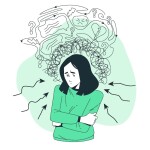Simplification is a deep-rooted feature of the mental operation of the brain. Faced with vast amounts of information, we naturally break it down into manageable pieces to process it more efficiently. The ability to simplify helps us to make quick decisions and understand the world.
But does this shortcut of the mind lead to problems? Actually, this is due to cognitive biases and systematic errors in thought created by the simplification tendency of our brain. So, now we will discuss how simplification, although useful, may lead us astray with cognitive biases that misshape judgment and see how to avoid these mental pitfalls.
Understanding Cognitive Bias
Cognitive bias refers to mental shortcuts or systematic errors in judgment that people make when processing information. These biases are based on the brain's tendency to simplify complex information to save time and effort. While sometimes this will help us make decisions faster, it usually produces flawed conclusions.
Simplification plays a key role in cognitive processing. Our brain simplifies the view if overloaded with vast amounts of data. It narrows focus to what feels familiar or important so we can make decisions even though the outside information may overwhelm us. That simple simplification leads to errors-perhaps particularly at critical moments, when a detail slips from your mind or perhaps when you rely too much on your preconceived ideas. Thus, simplification, in general words, can blur the way we perceive the world to make judgments that are not absolutely correct.
Simplification plays an important role in the cognitive process. It simply means that while very much burdened by large data, the brain simplifies by paying attention to the familiar or important, which allows you to make decisions without being burdened by lots of information. However, such simplification introduces an error. In fact, especially when the details are critical, we rely too much on
Common Cognitive Biases Related to Simplification
Several of these cognitive biases arise from the brain's tendency to over-simplify and often derive distorted views of reality. Let's take a look at some of the most frequent cognitive biases that stem from oversimplification in the following:

Confirmation Bias: It is observed in behavioral patterns as well as psychological tendencies that individuals do seek out or prefer information that supports what they believe and avoid any evidence that would contradict it. The tendency for oversimplification tends to marry wrong assumptions together and draw imperfectly the details of reality.
Anchoring Bias: Anchoring is when we over-influence the first piece of information received (the "anchor") and, therefore, let it absolutely dictate parts of our subsequent judgments. Such as a first impression or a price that skyrockets an initial value in an overwhelming way that overwhelms how we think about something, although perhaps not the most accurate assessment.
Stereotyping: Stereotyping is one of the cognitive biases where we overgeneralize traits about groups of people and narrow down their characteristics to unchangeable, narrow perceptions. Well, indeed, the categorization does help us process information rapidly, but again, that is just the fact, dangerous misconceptions, and unfair treatment.
Availability Heuristic: This occurs when we overestimate the strength of recency or availability events and allow them to warp our thought processes and decisions. In this case, simplification manifests itself as a remembrance of that which best comes to mind before it can be compromised by the need to weigh all information into account.
Real-Life Examples
Simplification-related cognitive biases play a role in nearly every facet of life, from personal decisions to public policies:
Politics: Confirmation bias occurs in the manner in which one selects sources of information that involve news that confirms an individual's political beliefs; it really makes meaningful discussion more difficult. Anchoring bias also occurs here when election decisions are made because of what a candidate says in an opening statement, and later, more accurate information can often be dismissed.
Medical field: In medicine, with the existence of heuristics, a doctor can misdiagnose a patient since he or she believes that with a similar symptom, a recent patient was treated that way, neglecting all kinds of diagnostics.
Interpersonal relationships: Stereotypes will control how we think of others in social interactions. For example, expectations about a person's work, gender, or origin can explain how we view their actions, making it difficult to fully understand others and potentially dividing society even more.
Workplace Simplification: At work, oversimplification may happen through judgments of a coworker's competency or behavioral motivation by an employer or employee based on superficial characteristics. This can lead to a potential lack of collaboration and even discrimination.
In these instances, cognitive biases can interfere with our making the right judgments, which further leads to relationships, career opportunities, and societal norms that are imperfect.
Ways to Overcome Simplification Bias
While cognitive biases are part and parcel of being human, there is still a couple of strategies we can adopt to avoid their influence on our thinking:
Mindfulness Alert: The first step towards overcoming such biases is knowing how the brain works. By acknowledging how our mind shortcuts processes, we can halt our activity for a brief moment to question if we are oversimplifying issues in life.
Seek Diverse Perspectives: One tends to make assumptions because one is only presented with like-minded folk or people who subscribe to the view that one holds. The reason we do not think for ourselves is because we continually see opposite opinions and experiences. This reduces the chances of making confirmation bias moves.
Challenge Assumptions: There are so many things we are afraid of and which happen only in our minds. We have the power to question our own beliefs and whether the thing we know is true. It is a good thing to think, "What am I not seeing?" to open up to more balanced thinking.
Collect Lucid Information: Rather than leaping to knee jerk judgments, examination of issues in detail makes sure we think through all the relevant data. This minimizes our tendency to be driven by anchoring bias or availability heuristics.
Balance between Simplification and Complexity
Simplification does not have to be inherently bad; it is a necessary part of how we work our brains through daily life. Absent it, we'd be hopelessly drowned by the sheer volume of information coming at us. But sometimes, the line between making sense of the world and oversimplifying it blurs to the extent of generating cognitive bias.
It has to be struck somewhere between over-simplification and over-complexity. One has to figure out when the shortcuts can be relied upon and when the details demand a more critical look. This is where one needs to apply critical thinking skills: when to simplify and when to dig into depth more subtly. In this way, with these skills, we can navigate the complexities of modernity without getting carried away by oversimplifications.
Conclusion
Our ability to generalize is one part of a double-edged sword. It helps process much information - and accelerates the time of processing information, but then leaves open the door to cognitive bias and predisposes us to unwanted distortions in our perception of reality and, consequently, to erroneous judgment. From confirmation bias, all these mental shortcuts up to stereotyping have far-reaching consequences regarding how we deal with personal relationships, make decisions at work, and interpret social problems.
Awareness solves the dilemma of the devastating side effects of simplification. Knowing ourselves and our cognitive biases is important; using strategies against them, such as mindfulness, questioning different viewpoints, and gathering comprehensive information, allows us to appreciate the world from a more critically nuanced perspective. And despite simplification playing out in our minds, striving for balance means keeping minds open and critical for examining all questions.
Take a minute and reflect on your thinking patterns. Do you simplify things excessively, which itself invites cognitive biases? Awareness of these tendencies allows you to develop even more thought-provoking, balanced approaches towards the world.
Solh understands. We offer a variety of features to help you invest in self-care.
Journaling for Self-Reflection: Sometimes, not being able to care for yourself can come from a lack of self-understanding. Solh's journaling feature allows you to explore your thoughts and feelings in a safe space. By reflecting on your experiences and desires, you can gain clarity on what is stopping you from self-care.
Anonymous Support Groups: You are not alone. Solh's anonymous support groups connect you with others who understand the struggle. Share your experiences, find comfort in solidarity, and discover new perspectives on overcoming the hurdle to indulge in self-care.
Solh Buddy: Feeling lost or disconnected? Your Solh Buddy, a personalized virtual companion, is here to provide encouragement and support along the way. It can offer prompts, celebrate your victories, and remind you of your strengths as you navigate the journey toward self-care.
Talk now: Sometimes, self-care can make you feel overwhelmed. Solh's Talk Now feature gives you access to dedicated counselors who can help you navigate such situations.
Solh believes in a unique approach to introducing self-care. We empower you to take charge of your well-being by offering a variety of tools. Explore Solh today and discover the power of self-reflection, connection, and support in overcoming any problem of the mind. You are not alone on this path.








